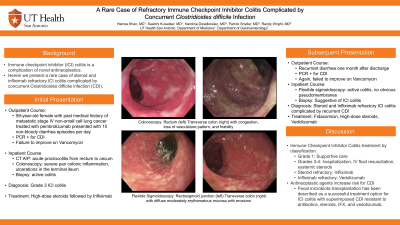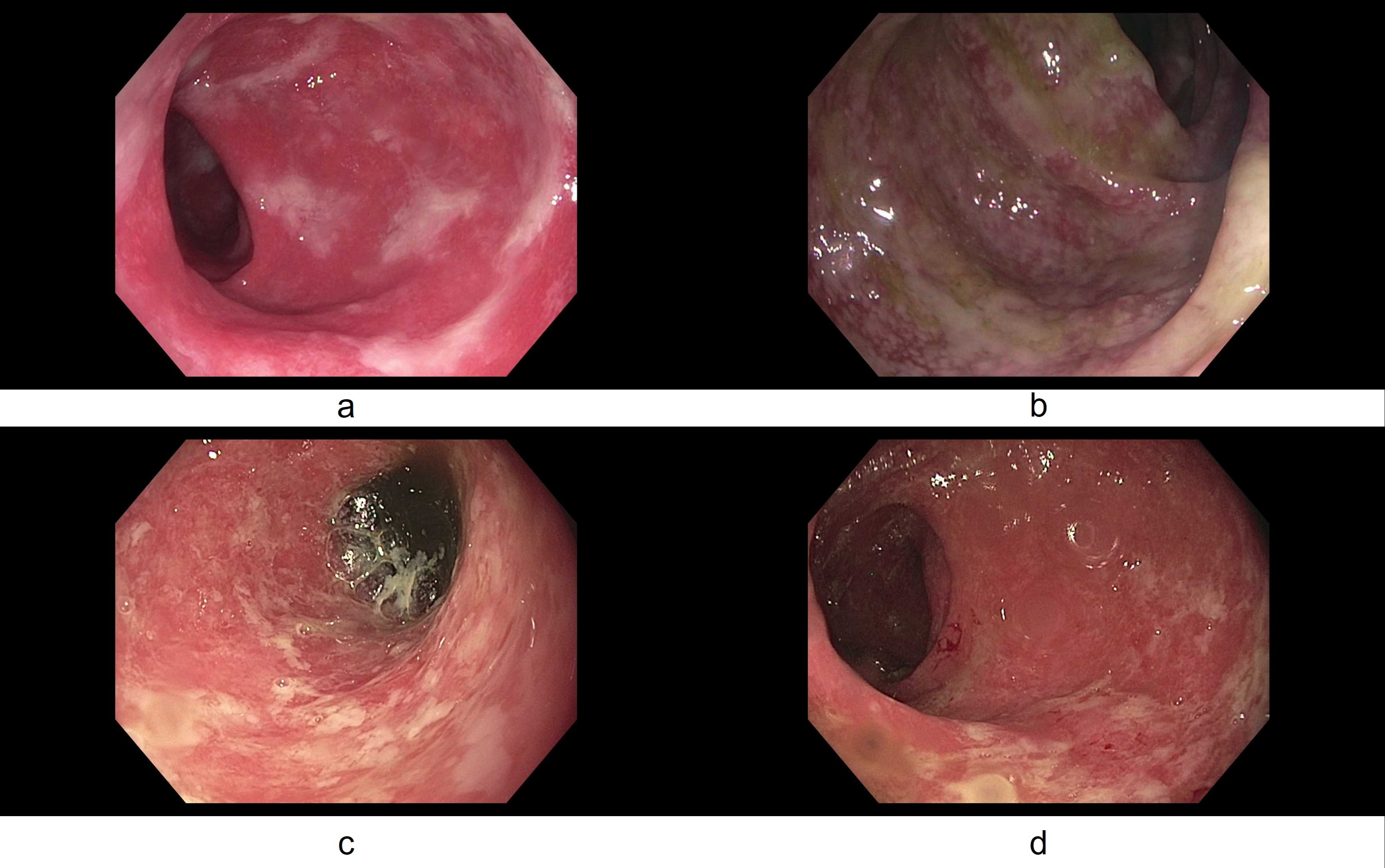Back


Poster Session A - Sunday Afternoon
Category: Colon
A0141 - A Rare Case of Refractory Immune Checkpoint Inhibitor Colitis Complicated by Concurrent Clostridioides difficile Infection
Sunday, October 23, 2022
5:00 PM – 7:00 PM ET
Location: Crown Ballroom

Has Audio
.jpg)
Hamza I. Khan, MD
University of Texas Health Science Center
San Antonio, TX
Presenting Author(s)
Hamza I. Khan, MD1, Saatchi Kuwelker, MD2, Karolina N. Dziadkowiec, MD3, Patrick Snyder, MD2, Randy Wright, MD2
1University of Texas Health Science Center, San Antonio, TX; 2UT Health San Antonio, San Antonio, TX; 3University of Texas Health San Antonio, San Antonio, TX
Introduction: Immune checkpoint inhibitor (ICI) colitis is a well-documented complication of novel antineoplastics. Herein we present a rare case of steroid and infliximab (IFX) refractory ICI colitis complicated by concurrent Clostridioides difficile infection (CDI).
Case Description/Methods: A 59-year-old female with a past medical history of metastatic stage IV non-small cell lung cancer treated with pembrolizumab initially presented with a complaint of ten non-bloody diarrhea episodes per day. A PCR was positive for CDI and the patient was prescribed PO Vancomycin. Despite 5 days of treatment, symptoms continued to worsen, and the patient was admitted for fevers and PO intolerance. CT A/P showed acute proctocolitis involving the large bowel from the rectum to the cecum. Colonoscopy showed severe pan colonic inflammation, ulcerations in the terminal ileum, and active colitis on biopsy. ICI colitis was suspected and the patient was started on high-dose steroids followed by IFX for grade 3 ICI colitis with significant improvement in stool frequency, abdominal pain, and a decrease in CRP. One month after discharge, the patient had recurrent symptoms with a PCR positive for CDI and was readmitted after again failing to improve on vancomycin. She was started on fidaxomicin and high-dose steroids. Flexible sigmoidoscopy again revealed active colitis, no obvious pseudomembranes, and biopsy suggestive of possible ICI colitis. Vedolizumab was started for recurrent ICI colitis with a resolution of diarrhea.
Discussion: Treatment of ICI colitis ranges from symptomatic management (grade 1) to hospitalization, IV fluid resuscitation, and systemic steroids (grades 3-4). Steroid refractory cases have been shown to respond to IFX in up to 80% of patients. As in our patient, vedolizumab has been shown to be effective in cases of steroid and IFX refractory ICI colitis. ICI colitis with superimposed CDI has been reported a handful of times. Antineoplastic agent use has been established as a risk factor for CDI through possible alterations in the normal gut flora. Fecal microbiota transplantation (FMT) has been described as a successful treatment option for ICI colitis with superimposed CDI resistant to antibiotics, steroids, IFX, and vedolizumab. Further studies should be conducted on whether FMT is an effective treatment option for ICI colitis with superimposed infection. As the use of ICIs continues to increase, clinicians should be aware of the therapeutic options available for the treatment of this rare entity.

Disclosures:
Hamza I. Khan, MD1, Saatchi Kuwelker, MD2, Karolina N. Dziadkowiec, MD3, Patrick Snyder, MD2, Randy Wright, MD2. A0141 - A Rare Case of Refractory Immune Checkpoint Inhibitor Colitis Complicated by Concurrent Clostridioides difficile Infection, ACG 2022 Annual Scientific Meeting Abstracts. Charlotte, NC: American College of Gastroenterology.
1University of Texas Health Science Center, San Antonio, TX; 2UT Health San Antonio, San Antonio, TX; 3University of Texas Health San Antonio, San Antonio, TX
Introduction: Immune checkpoint inhibitor (ICI) colitis is a well-documented complication of novel antineoplastics. Herein we present a rare case of steroid and infliximab (IFX) refractory ICI colitis complicated by concurrent Clostridioides difficile infection (CDI).
Case Description/Methods: A 59-year-old female with a past medical history of metastatic stage IV non-small cell lung cancer treated with pembrolizumab initially presented with a complaint of ten non-bloody diarrhea episodes per day. A PCR was positive for CDI and the patient was prescribed PO Vancomycin. Despite 5 days of treatment, symptoms continued to worsen, and the patient was admitted for fevers and PO intolerance. CT A/P showed acute proctocolitis involving the large bowel from the rectum to the cecum. Colonoscopy showed severe pan colonic inflammation, ulcerations in the terminal ileum, and active colitis on biopsy. ICI colitis was suspected and the patient was started on high-dose steroids followed by IFX for grade 3 ICI colitis with significant improvement in stool frequency, abdominal pain, and a decrease in CRP. One month after discharge, the patient had recurrent symptoms with a PCR positive for CDI and was readmitted after again failing to improve on vancomycin. She was started on fidaxomicin and high-dose steroids. Flexible sigmoidoscopy again revealed active colitis, no obvious pseudomembranes, and biopsy suggestive of possible ICI colitis. Vedolizumab was started for recurrent ICI colitis with a resolution of diarrhea.
Discussion: Treatment of ICI colitis ranges from symptomatic management (grade 1) to hospitalization, IV fluid resuscitation, and systemic steroids (grades 3-4). Steroid refractory cases have been shown to respond to IFX in up to 80% of patients. As in our patient, vedolizumab has been shown to be effective in cases of steroid and IFX refractory ICI colitis. ICI colitis with superimposed CDI has been reported a handful of times. Antineoplastic agent use has been established as a risk factor for CDI through possible alterations in the normal gut flora. Fecal microbiota transplantation (FMT) has been described as a successful treatment option for ICI colitis with superimposed CDI resistant to antibiotics, steroids, IFX, and vedolizumab. Further studies should be conducted on whether FMT is an effective treatment option for ICI colitis with superimposed infection. As the use of ICIs continues to increase, clinicians should be aware of the therapeutic options available for the treatment of this rare entity.

Figure: Figure a: Colonoscopy image 1. Figure b: Colonoscopy image 2. Figure c: Flexible sigmoidoscopy image 1. Figure d: Flexible sigmoidoscopy image 2
Disclosures:
Hamza Khan indicated no relevant financial relationships.
Saatchi Kuwelker indicated no relevant financial relationships.
Karolina Dziadkowiec indicated no relevant financial relationships.
Patrick Snyder indicated no relevant financial relationships.
Randy Wright indicated no relevant financial relationships.
Hamza I. Khan, MD1, Saatchi Kuwelker, MD2, Karolina N. Dziadkowiec, MD3, Patrick Snyder, MD2, Randy Wright, MD2. A0141 - A Rare Case of Refractory Immune Checkpoint Inhibitor Colitis Complicated by Concurrent Clostridioides difficile Infection, ACG 2022 Annual Scientific Meeting Abstracts. Charlotte, NC: American College of Gastroenterology.
